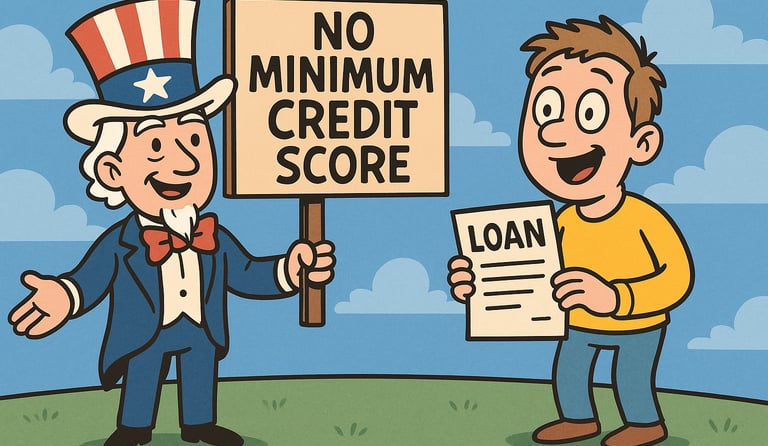The Credit Score Shakeup: What Fannie Mae's New Rules Mean for Your Homebuying Dreams 🏡✨
Remember when everyone said you needed a 620 credit score to buy a house? Well, grab your coffee ☕—things just got interesting.
Thomas Brady
11/13/20254 min read


The Big News That Almost Flew Under the Radar 📰
In a move that's quietly reshaping the mortgage landscape, Fannie Mae just dropped a bombshell that could change the homebuying game for thousands of Americans. Effective November 16, 2025, they're eliminating that infamous 620 minimum credit score requirement for loans processed through their Desktop Underwriter (DU) system.
Yes, you read that right. That magic number that's kept countless would-be homeowners on the sidelines? It's officially getting the boot. 🚪👋
So What Actually Changed? 🔄
Here's the deal: Fannie Mae isn't just lowering the bar—they're changing the entire evaluation process. Instead of using a hard credit score cutoff (you know, that "sorry, you're 619, better luck next time" scenario), they're taking a more holistic approach.
The new system evaluates a broader picture of your financial life:
Your complete credit history (not just a three-digit number) 📊
Your income stability 💰
Your debt-to-income ratio 📈
Other credit risk factors that paint a fuller picture of who you are as a borrower
Think of it less like a velvet rope at an exclusive club and more like a thoughtful interview where your whole story matters.
Why This Matters (Like, Really Matters) 🎯
For First-Time Buyers: If you've been building your financial life carefully but got dinged for that medical bill you didn't know about, or that time your ex forgot to pay the cable bill three years ago—there's new hope. Your consistent rent payments and solid income might actually count for something now. 🌟
For Young Professionals: Fresh out of school with student loans but a great job? The old system might have said "come back later." The new one might actually look at your earning potential and payment history. 🎓💼
For Credit Newbies: Trying to get your first mortgage without much credit history used to be like trying to get experience for an entry-level job that requires experience. This change could break that frustrating cycle. 🔓
The "But Wait, There's More" Fine Print ⚠️
Before you start house-hunting with a 550 credit score, let's pump the brakes:
Lenders Still Have Their Own Rules: Just because Fannie Mae removed the minimum doesn't mean every lender will follow suit. Many will still have their own requirements (called overlays in industry speak). 🏦
Credit Scores Still Matter: You still need to provide your credit score—it's just not an automatic dealbreaker anymore. Better scores will still get you better rates. 💯
PMI Companies Have Opinions Too: Private mortgage insurance companies might have their own minimums, especially if you're putting down less than 20%. 🛡️
What's Really Behind This Change? 🤔
According to FHFA Director Bill Pulte, this isn't actually about loosening underwriting standards—it's about breaking up what many consider a monopoly. Fair Isaac Corporation (FICO) has been the sole gatekeeper for so long that their fees have reportedly increased by over 1,000% in just three years.
Translation: You've been paying more for credit checks that may not even reflect your true creditworthiness. 💸
The government's essentially saying: "We've got enough data now to evaluate borrowers more fairly without relying solely on one company's scoring model."
How This Could Affect Your Home Search 🔍
Scenario 1: The Almost-There Borrower Meet Sarah, whose credit score is 610 because she had one rough year during the pandemic. She's been crushing it for 18 months since, with perfect payment history and a solid income. Under the old rules? No go. Under the new ones? She's got a fighting chance. ✊
Scenario 2: The Thin-File Wonder Then there's Marcus, who's been living debt-free and paying cash for everything (respect, Marcus 👏). His credit score is mediocre simply because he doesn't use credit much. The new system might actually reward his responsible financial behavior instead of penalizing it.
Scenario 3: The Rebuilder Lisa had a rough divorce three years ago that tanked her credit. Since then, she's rebuilt everything—stable job, emergency fund, pristine payment history. Now the system might actually recognize her comeback story. 📈💪
The Ripple Effect 🌊
This change isn't happening in a vacuum. Freddie Mac already made similar moves, and now with Fannie Mae on board, we're seeing a genuine shift in how mortgage lending works in America. This could mean:
More competition in credit scoring (goodbye monopoly pricing) 👋
Lower costs passed down to borrowers 💵
More Americans qualifying for homeownership 🏠
A more equitable lending system overall ⚖️
Should You Get Excited? 🎉
If you've been on the fence about applying for a mortgage because your credit score was "close but not quite," absolutely. But manage those expectations wisely:
Do talk to multiple lenders about your options ✅
Don't assume you'll automatically qualify with a 500 credit score ❌
Do continue working on your credit (better scores = better rates) ✅
Don't wait forever thinking the perfect score is required ❌
The Bottom Line 💡
This isn't a free-for-all where credit doesn't matter anymore. Think of it more like the difference between a pass/fail class and one with a grading curve. Your whole performance matters now, not just one final exam score.
For homebuyers who've been working hard but felt locked out by a rigid system, this is genuinely good news. It's a recognition that people are more than a three-digit number, and that responsible financial behavior comes in many forms. 🙌
The housing market just got a little more accessible. Whether you're ready to take advantage of it depends on your overall financial picture—not just that one magic number.
Next Steps 🚀
If you're in the market for a home:
Check Your Credit Anyway: It still matters for your rate, even if it's not a hard cutoff 📋
Talk to Lenders: Ask specifically about their policies post-November 16 📞
Document Everything: Your payment history, income stability, and financial responsibility story matter more than ever 📁
Stay Realistic: This opens doors, but you still need to walk through them prepared 🚪
The rules of the game just changed. For many aspiring homeowners, that's the best news they've heard in years. 🎊
Ready to Explore Your Options? Let's Talk! 🤝
Whether you're a first-time buyer wondering if this new policy could help you, or you've been on the sidelines waiting for the right moment—I'm here to help you navigate these changes and find your path to homeownership.
Thomas Brady
SFR, e-PRO, SRES, BPOR, C_REPS
Licensed Associate Real Estate Broker / Director of Operations
Notary Public | Retired N.Y.P.D. Lt. | U.S. Air Force Veteran 🇺🇸
Vintage American Realty LLC
1551 Montauk Hwy, Suite E
Oakdale, NY 11769
📞 631-682-8660
📧 TomBradyHomes@Gmail.com
🌐 VintageAmericanRealty.com
Let's turn your homeownership dreams into reality! 🏡💫
Disclaimer: Mortgage lending requirements vary by lender, location, and individual circumstances. This article is for informational purposes only and should not be considered financial advice. Always consult with licensed mortgage professionals about your specific situation.
Vintage American Realty, LLC
Vintage American Realty, LLC is licensed in the State of New York
office: 631.319.4564
broker: 631.816.0719
info@vintageamericanrealty.com
1551 Montauk Hwy, Ste E
Oakdale, NY 11769
Long Island, NY


